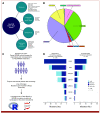Pancreatic Cancer Action Network's SPARK: A Cloud-Based Patient Health Data and Analytics Platform for Pancreatic Cancer
- PMID: 38166233
- PMCID: PMC10803046
- DOI: 10.1200/CCI.23.00119
Pancreatic Cancer Action Network's SPARK: A Cloud-Based Patient Health Data and Analytics Platform for Pancreatic Cancer
Abstract
Purpose: Pancreatic cancer currently holds the position of third deadliest cancer in the United States and the 5-year survival rate is among the lowest for major cancers at just 12%. Thus, continued research efforts to better understand the clinical and molecular underpinnings of pancreatic cancer are critical to developing both early detection methodologies as well as improved therapeutic options. This study introduces Pancreatic Cancer Action Network's (PanCAN's) SPARK, a cloud-based data and analytics platform that integrates patient health data from the PanCAN's research initiatives and aims to accelerate pancreatic cancer research by making real-world patient health data and analysis tools easier to access and use.
Materials and methods: The SPARK platform integrates clinical, molecular, multiomic, imaging, and patient-reported data generated from PanCAN's research initiatives. The platform is built on a cloud-based infrastructure powered by Velsera. Cohort exploration and browser capabilities are built using Velsera ARIA, a specialized product for leveraging clinicogenomic data to build cohorts, query variant information, and drive downstream association analyses. Data science and analytic capabilities are also built into the platform allowing researchers to perform simple to complex analysis.
Results: Version 1 of the SPARK platform was released to pilot users, who represented diverse end users, including molecular biologists, clinicians, and bioinformaticians. Included in the pilot release of SPARK are deidentified clinical (including treatment and outcomes data), molecular, multiomic, and whole-slide pathology images for over 600 patients enrolled in PanCAN's Know Your Tumor molecular profiling service.
Conclusion: The pilot release of the SPARK platform introduces qualified researchers to PanCAN real-world patient health data and analytical resources in a centralized location.
Conflict of interest statement
The following represents disclosure information provided by authors of this manuscript. All relationships are considered compensated unless otherwise noted. Relationships are self-held unless noted. I = Immediate Family Member, Inst = My Institution. Relationships may not relate to the subject matter of this manuscript. For more information about ASCO's conflict of interest policy, please refer to
Open Payments is a public database containing information reported by companies about payments made to US-licensed physicians (
Figures


References
Publication types
MeSH terms
LinkOut - more resources
Full Text Sources
Medical

